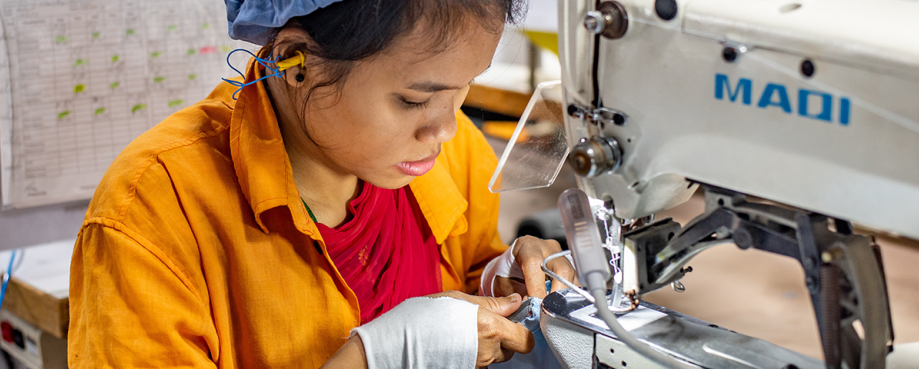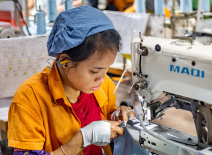
In October 2023, the Ethical Trading Initiative (ETI) and the Partnership for Sustainable Textiles (PST) embarked on a collaborative pilot project in Tamil Nadu, India. The aim was to explore how fashion brands and suppliers can work jointly to strengthen their understanding and use of gender-disaggregated data as part of effective human rights due diligence.
This initiative highlights the importance of shared responsibility and learning between brands and suppliers to address workplace inequality and promote responsible business practices.
Why gender-disaggregated data?
Over the past few years, ETI and PST have been engaging their respective company members on the value of gender disaggregated supply chain data. However, in the course of disseminating the ETI Gender Data Guidance, brands shared a common challenge: limited supplier capacity and confidence in accurately collecting this data.
Brands rely on suppliers to provide them with data through self-assessment questionnaires and other forms of documentation. However, there are often challenges with data accuracy and a general lack of understanding by suppliers as to why this data should be made available. Too often, workplace data treats all workers as a homogenous group, which makes it difficult to understand certain risks and inequities that may be gender-related. This obscures patterns of discrimination or unequal treatment and can lead to well-meaning policies that fail to respond to the specific needs of women, gender-diverse workers, and other marginalised groups.
Gender-disaggregated data allows all stakeholders — brands, suppliers, and workers — to better understand and address the root causes of workplace inequality.
Project objectives
The pilot project worked with a select number of ETI and PST brands and their suppliers in the garments sector to develop their understanding of gender disaggregated data. Working with tier 1 suppliers in Tamil Nadu’s garment sector, the pilot focused on:
- Building mutual understanding of gender-disaggregated data between brands and suppliers
- Creating space for reflection and dialogue on how gender dynamics affect workplace experiences
- Co-developing practical guidance to support suppliers in collecting, analysing, and applying gender data in their operations
What we learned
The needs assessment and supplier engagement activities revealed several systemic barriers
- Compliance culture limits meaningful data use
Suppliers often interpret data requests as part of audits, leading to a transactional approach rather than one focused on improving workplace practices. - Limited use of existing data
Suppliers may already collect data on absenteeism, turnover, or workforce composition, but often without disaggregating or analysing it through a gender lens. This limits their ability to respond to underlying issues affecting workers differently. - Cultural and structural resistance
Some suppliers operate in environments shaped by traditional gender roles, where recognising gender inequality, or addressing it, is seen as unnecessary or outside of business priorities. - Perceived cost outweighs perceived benefits
Many suppliers view gender data collection and analysis as resource-intensive with no immediate business return. Without clear links to operational improvements or worker wellbeing, investment is deprioritised.
Guidance for suppliers on gender-disaggregated data
In response to these findings, ETI and PST developed new supplier-focused guidance to support practical approaches to collection and use of gender data.
The guidance includes:
- An introduction to gender-disaggregated data, what it is and why it matters
- A set of key gender data indicators, how to collect them and what they reveal
- Approaches to analysis, showing how data can inform more inclusive policies and practices
Importantly, the guidance recognises that suppliers are at different points in their journey and that progress requires collaboration, not compliance alone.
When gender-disaggregated data is used effectively, it helps surface issues that may otherwise go unnoticed, enabling actions that respond to the real experiences of all workers.
Next steps
Suppliers have a vital role to play in creating workplaces that are fair, safe, and respectful of everyone’s rights. Through the use of data, suppliers can uncover the root causes of gender-based discrimination in their factories and move beyond treating symptoms. At the end of the day, gender-disaggregated data is only valuable if it is properly analysed and used to inform decision-making aimed at achieving positive outcomes for all workers, especially women and other marginalised groups. This guidance is designed to support that process, not prescribe it, and we invite suppliers and brands alike to use it as a tool for reflection, dialogue, and practical change.
Download the Guidance for suppliers on gender disaggregated data, and the Key takeaways summary, below.
Gender disaggregated data: guidance for suppliers

